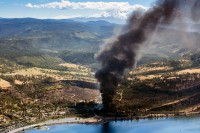In 2014, Union Pacific proposed a major rail expansion project through Mosier from Memaloose State Park to the Hood River County line.

In a victory for Tribal treaty rights, the community of Mosier, Oregon, and conservationists, Union Pacific Railroad (UP) has thrown in the towel on its proposed 5.37-mile rail expansion project near Mosier.
This fall, Columbia Riverkeeper, Friends of the Columbia Gorge, Oregon Physicians for Social Responsibility, and other conservation allies joined with the Confederated Tribes of Warm Springs, Confederated Tribes of the Umatilla Indian Reservation, and Confederated Tribes and Bands of the Yakama Nation in signing a court supervised settlement agreement with Union Pacific. The agreement cemented the withdrawal of UP’s proposal and a moratorium on future projects in the Mosier area for the next five years. The settlement also requires consultation with the Tribal nations on any future projects.
A seven-year battle
In 2014, during the height of the oil-by-rail boom, Union Pacific proposed a major rail expansion project through Mosier from Memaloose State Park to the Hood River County line. The project area included the site of the 2016 oil train derailment, which resulted in a spill and fire that threatened Mosier and the Columbia River.
The rail proposal would have violated numerous requirements of the Columbia Gorge National Scenic Area Act and Wasco County’s land use ordinance and, notably, would have violated treaty rights by impeding access to the Columbia River and a treaty-protected tribal fishing site. Friends and our allies joined with Tribal nations in opposing the project, and in 2016, before an auditorium packed with project opponents, Wasco County denied the application based on the likely adverse impacts on treaty rights.
Union Pacific appealed the decision to the Columbia River Gorge Commission, where Friends, Tribes, and our allies defended Wasco County’s denial. In a 9-3 decision, the Gorge Commission upheld the denial.
The rail company then took the fight to state and federal court. After losing in federal district court, Union Pacific appealed to the Ninth Circuit Court of Appeals, and the parties agreed to enter into court-supervised mediation.
A win for coming generations
This summer, after 18 months of negotiations, Union Pacific decided to withdraw their proposal and settle all related outstanding cases. In addition to the withdrawal of the project the settlement includes a moratorium on future rail expansion in the area of the proposed project for a period of five years, and also includes agreements between Union Pacific and the Tribal Nations to consult on future projects.
JoDe Goudy, then-Chair of the Confederated Tribes and Bands of the Yakama Nation, speaks at a rally in Mosier on the one-year anniversary of the June 2016 oil train derailment and fire. (photographer: Kyle Ramey for Stand Up to Oil)
Commenting on the victory, Friends Staff Attorney Steve McCoy said, “After years of work and extensive collaboration with the Treaty Tribes, we’re thrilled that the expansion project has been withdrawn and that Treaty Tribes will be consulted on harms to their treaty rights and cultural and natural resources, regardless of any change in law. This is a durable settlement that we anticipate will benefit the Treaty Tribes and the Gorge for generations to come.”
The decision is a victory for Tribal treaty rights, conservationists, and Gorge residents—including in the community of Mosier, Oregon, which is still recovering from the June 2016 Union Pacific oil train derailment, spill, and fire that lasted nearly 14 hours and leaked 47,000 gallons of crude oil and contaminated local groundwater.
Lauren Goldberg, legal and program director for Columbia Riverkeeper, added: “People who live and fish along the Columbia River can breathe a sigh of relief,” said. “Tribal Nations led a multi-year effort to hold the railroad industry accountable for its impacts to people that rely on a clean Columbia River. We were honored to work in solidarity with Yakama Nation, Warm Springs, and Confederated Tribes of the Umatilla Indian Reservation.”
Working together for a safer future
The fall 2021 settlement is the latest in a series of ongoing partnerships by conservation groups in Oregon and Washington in collaboration and solidarity with Tribal Nations, local elected leaders, and a dedicate corps of community activists around the Pacific Northwest to oppose irresponsible fossil fuel development projects and the continued un-safe transport of oil, coal, and other fossil fuels by rail.
Union Pacific Railroad, Wasco County, the Yakama Nation, and Friends of the Columbia Gorge along with Columbia Riverkeeper and Oregon Physicians for Social Responsibility are all parties to the settlement. Non-party Friends of the Court participants include the Yakama Nation, the Confederated Tribes of the Warm Springs Reservation of Oregon, Confederated Tribes of the Umatilla Indian Reservation, the Columbia River Intertribal Fish Commission, and Oregon Wild.
Learn More About Tribal Treaty Rights
Working Towards Equitable Harvest (Columbia River Inter-Tribal Fish Commission)


